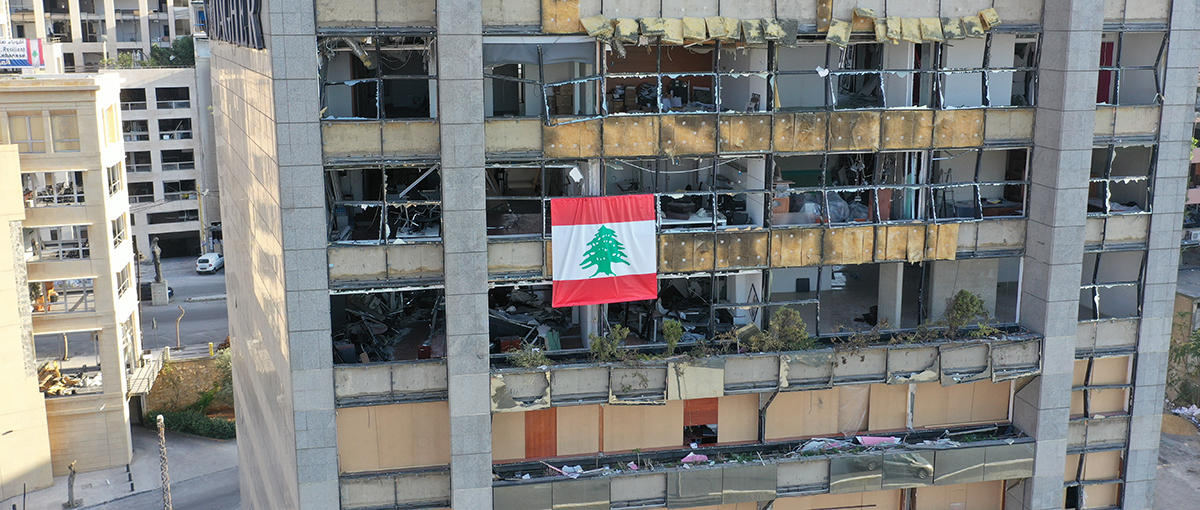#MIPexperience i-FLEX
«Between MIP and the Red Cross: study and work to help Lebanon»

Christian Lenz is enrolled in the i-Flex EMBA programme at MIP Politecnico di Milano. A course of study that he is able to follow from Beirut, where he leads a team of engineers involved with public health. Here he talks about the challenges of this job and reconciling his studies with such a challenging role
Working for the International Committee of the Red Cross (ICRC) in a country like Lebanon and, at the same time, pursuing a master’s at MIP Politecnico di Milano. This is what Christian Lenz, deputy water and habitat coordinator for the organization and, at the same time, student in the 2019-2021 i-Flex course, does. A double commitment that undoubtedly leaves room for little else: «The pressure, both in my studies and in work, changes over time and can lead to significant levels of stress», he explains. «But there are also benefits. Thanks to the master’s, I’m more aware of the key issues when I draw up a budget, and I’ve developed a good background that allows me to understand the dynamics of the economic crisis in Lebanon. This has made my work more satisfactory, more technically sound and also more efficient».
The explosion of Beirut
Christian Lenz has worked for the ICRC for over four years. Currently, he is working for the department that deals with public health: «I lead a team of engineers. One key aspect is the integration of these activities in the broader spectrum of what the ICRC does, with the aim of maximizing the humanitarian impact». The dramatic event that took place in the Lebanese capital on 4 August (the explosion of a warehouse at the port, which killed more than 200 people and injured 7,000) required an enormous effort of Lenz and the ICRC: «The Red Cross is an organization used to operating in emergency situations, so we were able to respond immediately to the most urgent needs. The morning after the explosion, our engineers worked side by side with local authorities, restoring water supplies for 120,000 people by the end of the afternoon», he says. «We continue to respond to the pressing needs through provision of medical supplies, cash donations to the most impacted families, as well as mental health and psychosocial support to affected people».
Challenges, obstacles, emergencies: a different type of job
Therefore, Lenz’s work isn’t a job like all others, given the backdrop and the almost always difficult situations in which he operates: «The Red Cross is present in situations of armed conflict and violence. This increases the level of challenge compared to “normal” working environments. In addition to technical obstacles, we face other challenges: understanding the context in which we work, identifying the most pressing humanitarian needs and setting priorities, but also taking care of our staff and leading them in difficult conditions. In emergency situations, we are called on to make decisions based on limited information and then to come up with solutions that would be cost and time effective. It can be very stressful. In some situations, logistical constraints can slow down our work significantly».
The importance of soft skills in a humanitarian context
But if these challenges are eminently technical, it’s also true that it wouldn’t be possible to face them without excellent soft skills. Skills that Lenz is developing also thanks to the EMBA programme: «Soft skills allow you to deliver quality work, even when it’s of a technical nature. In a humanitarian context they are probably even more important: we are constantly finding ourselves in new and unknown situations. We work in multicultural teams, whose members come from dozens of countries. It’s extremely important to know how to approach things with an open mind, to be respectful, always maintaining a positive attitude. To find your bearings and develop meaningful strategies it’s essential to listen to others, whether they are colleagues or people affected by violence and armed conflict».
i-Flex: the advantages of a flexible format
In a context like this, it’s the i-Flex format that allows Lenz to attend the EMBA programme: «It is almost entirely digital. Coming from a traditional approach, at first it scared me. But during the first week, held in-person, we were introduced to the concepts of online education and collaboration. I adapted and learned quickly that online education and collaboration represent the future. Interactions with my classmates are enjoyable. I recommend the i-Flex to anyone who is interested in a high quality international EMBA and requires flexibility both in terms of time and geography».





